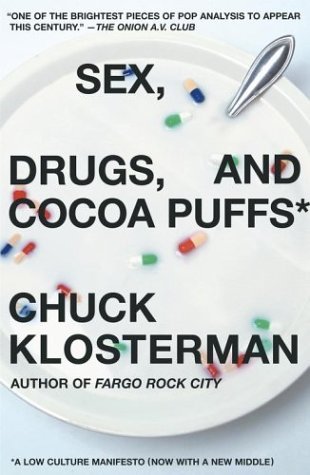I just finished reading Sex, Drugs and Cocoa Puffs by Chuck Klosterman (2003). The book is billed as “a low culture manifesto,” and is a jumbled mess of humor, pop analysis and lowbrow philosophy. I didn’t like it. I’ll try to talk about parts I did like below.
The book is laugh-out-loud funny at times, and packed with pop culture references that I didn’t get (this was less educational than I hoped). In terms of actual content though, Klosterman seems to thrive on mashing up unrelated topics and daring the reader to point out that he hasn’t actually said anything. This is punctuated in the self-defeating way he ends most of his chapters, with a thought that contradicts his whole argument. The man seems desperate to commit to nothing (see his comments on religion in chapter 18). I think I would find Chuck profoundly boring in real life.
The first definite thought I got out of the book is in chapter 4, where he reflects that celebrity has become separated from any actual talent or skill or achievement. “In the idiom of rock,” he writes, “being cool is pretty much the whole job description.” Chuck returns to this idea throughout the book (it’s the only theme I could identify) and while it’s not the most original idea I’ve ever heard, it’s certainly an important one. I observed the same thing before reading this book, which brings me to Chuck’s most practical observation, in chapter 14.
Chapter 14 is about the Dixie Chicks and country music and Wal-Mart. Chuck argues that modern country music isn’t about being cool, and it isn’t about music either; the lyrics are what make country music popular to the Wal-Mart consumer population. He says that the reason pop country will never go out of style is because its ideas filter up from the lifestyle of the Wal-Mart shoppers. He writes, “when those Wal-Mart shoppers eventually hear their own ideas on the radio, it somehow seems fresh.” That Chuck understands this idea is probably why Sex, Drugs and Cocoa Puffs is a New York Times bestseller: There’s not much original thought. He’s just regurgitating the muddled noncommittal philosophy of the average progressive media-gorged American. What’s familiar, sells.
Sadly, this is an important observation. If you want to produce something that really sells, make people feel smart by telling them what they already know. If you want fade into obscurity and only be remembered by the people who live in ivory towers and/or their parents’ basement, be original and insightful and talented. I find this anti-intellectualism disgusting, but I have to admit that it’s often true in our society. I’m reminded of the most recent Family Guy episode, “Brian Writes a Bestseller”. Brian writes a vapid self-help book that sells very well. In the end he’s ridiculed as a sellout, but nobody ever observes that writing an empty, successful book would enable Brian to go back to his less popular, more meaningful work. Being a sellout sometimes seems like a necessity of life. Very few people are paid to do their favorite thing, and I would argue that more people love their job in this century than in most of human history. When did work and fun start to overlap?
Which brings me to the question: Does Chuck Klosterman have something incisive and meaningful to write, that he needs to fund with this relatively shallow book? Or is he just funding his favorite things (potentially listed in the title)?
